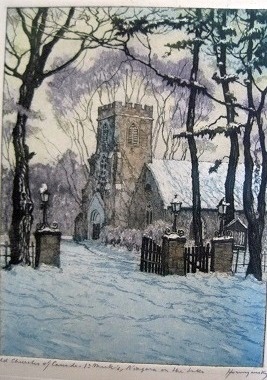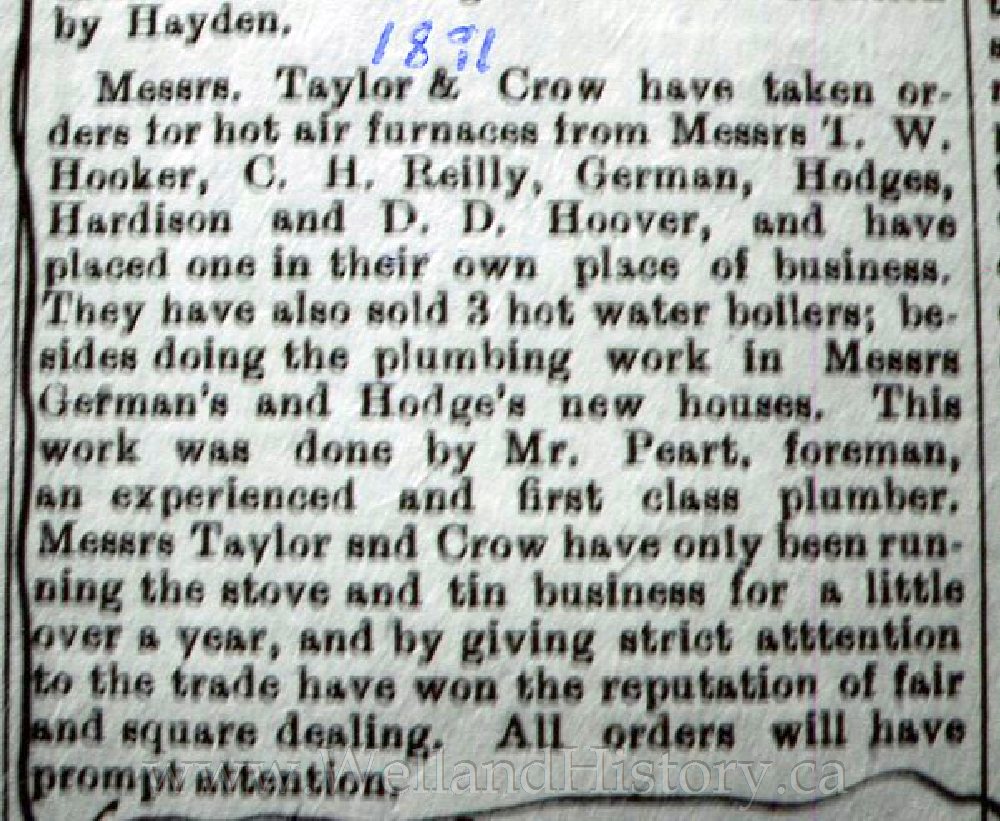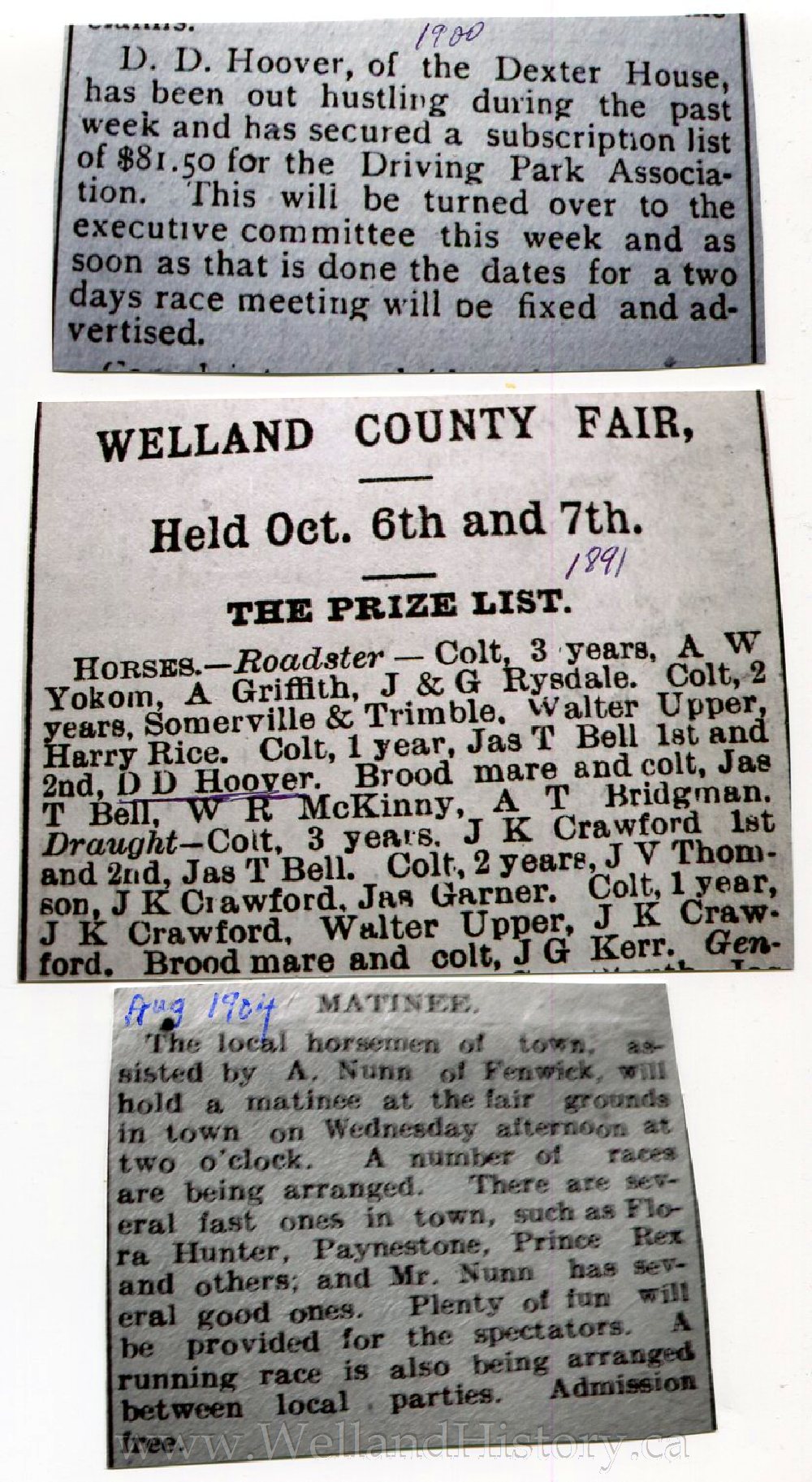[Welland Tribune, 25 December 1891]

Unable to decipher name of artist.
The federation of this church was laid in 1792 in which year the Rev. Robt. Addison was appointed by the Society for the Propagation of the Gospel in foreign parts, missionary and rector of the parish of Niagara. The first entry in the register was the wedding of Henry Warren and Catharine Algor in 1792.
“May 31, 1793, died Mrs. Catharine Butler, wife of Col. Butler.”
“January 25, 1794 was buried E. Kerr, wife of Robert Kerr, Esq.,”
Mrs. Kerr (Elizabeth) was a daughter of Sir William Johnson and his wife Mollie Brant, sister of Thayendanegea. Mr. Kerr was a near relative to the Duke of Roxorough. One of his sons was Col. Wm. T. Kerr, of Wellington Square now Burlington, Ont. Another entry in St. Mark’s church register is the burial of C. John Butler of the Rangers, May 15, 1796.
The history of Upper Canada of 100 years ago is full of interest.
There is an excellent book, “Stones, Saints & Sinners “ Walking tours of Niagara-on-the Lake’s large historic cemeteries” written by Fred Habermehl and Donald L. Combe.


[Welland Telegraph, 3 July 1891]
The gentlemen from the other side, who came over to locate a site for a glass factory on Saturday last, were driven by Reeve Cronmiller out to Solid Comfort, where they were introduced to Mr. P. McIntyre, the founder of the resort who kindly escorted them around the grove and explained all the many comforts to be derived by living at Solid Comfort. The collection of curiosities found in the mound on which the flag pole is raised, which includes some very perfect Indian skulls were duly examined, and Mr. McIntyre, who must certainly be a collector of no mean repute, gave a very graphic lecture as to the uses of the various articles found, and the company which had somewhat increased in numbers listened to the same with the keenest interest. The next place to visit was the club house or dining room, and there is no doubt but what under the able management of Mr. R.C. Avery that the club is one of the best managed in Canada, everything is spotlessly clean and order prevailed everywhere. All the cooking is done with natural gas, and although there is a very large range suitable for cooking for about 400 people, in the kitchen there was no unpleasant amount of heat, and the different workers were very busy serving dinner and did not appear to notice the heat at all. The Reid Combination oven for bread and pastry is certainly a marvel of simplicity and perfectness, and it is only to be known to be in use in every club, restaurant and hotel. At the present invitation of Mr. McIntyre, the party to the number of nine sat down to dinner at 1.30 and due justice was done to all the good things provided; there is no higher compliment to be paid the steward, Mr. Avery, than quoting the words of one of the southerners, “Yes, Mr. Avery feeds us well, in fact he feeds us too well.” Mr. McIntyre was wise in his choice of a name for the home as “Solid Comfort,” conveys to the tired city merchant prince just what it is, a place of rest; then the children may roam about in perfect safety; no dangerous tide or deep water to engulf them, and no rocks to fall over and injure their bodies, and the parents can spend their days in perfect bliss in watching the ever changing scenes that are ever occurring on land or water, with never a thought as to what they shall or what they shall not drink.
[Welland Telegraph, 23 October 1891]
Mrs. Hopkins, wife of Mr. Samuel Hopkins, died at her residence on Tuesday morning, when she had within about a month complete her 65th year. Deceased for some time had been delicate from the effects of epilepsy, but no suspicion was entertained that dissolution was so near until Sunday. On Saturday night she retired at the usual hour, and on Monday morning was discovered in an unconscious state from which she did not rally. Deceased had been a resident of Port Colborne for about 40 years, and on the 29th of July next would have celebrated her golden wedding anniversary. The funeral took place yesterday and the remains were interred in Grabiel’s cemetery.
[Welland Telegraph, 13 February 1891]
Mr. Joseph C. Young, of Chicago, who left here 30 years ago, is here visiting the land of his birth and scenes of his childhood. Mr. Young is doing a good business in the Western Metropolis as an “Iron Setter” which means putting together the tall iron buildings, and has amassed a comfortable competency. During the 30 years since he left here, he has, until the present time only visited us once, about 17 years ago, but we hope now to see him more frequently as he has purchased a piece of property on the Welland river, opposite his old homestead, and intends fitting up the building thereon as a summer residence, for the use of himself and family. Many old friends will be glad to welcome him.
[Welland Telegraph, 9 October 1891]
A happy event transpired at the Lutheran church, Stonebridge, on Thursday of last week, when the marriage of Miss Sophia Cronmiller, daughter of Reeve Cronmiller, to Mr. Nicholas Richeld, of Rainham, took place, the Rev. Mr. Bente tying the nuptial knot. The bridesmaids were Miss Lizzie Cronmiller, sister of the bride, Misses Annie and Susie Richeld, sisters of the groom, and Miss Amelia Boneburg, with Messrs. Jacob Richards, John White, C. Held and Wm. Fess as groomsmen. After the ceremony a wedding dinner was given at the residence of the bride’s parents. The presents were numerous, comprising articles of value both useful and ornamental. On Friday the happy couple left for an eastern tour, after which they will reside in Rainham. The TELEGRAPH heartiest congratulations are extended.
Married: 1 October 1891
[Welland Telegraph, 27 February 1891]
Mrs. J.J. Morton was summoned to Hamilton by telegraph on Saturday last to the death bed of her mother, Mrs. Simpson, but she arrived too late to see her alive.
[Welland Telegraph, 17 April 1891]
“Solid Comfort” is commencing to show signs of life and preparations for the reception of the summer influx are taking definite shape. One of the most important pieces of work is the water works, and Mr. L.G. Carter has been in Toronto this week negotiating for the boiler, engine and pumping machinery. The engine will be a six horse power, which will be sufficient for the use required of it, and the capacity of the pump in 3,000 gallons per hour. A 200 barrel tank, at an elevation of 70 feet above the lake level, will be kept filled to feed and supply pipes, so that the machinery will not be required to run continuously. From the lake to the pump 500 feet of 3 ½ inch pipe will be uses, and for the mains from the tank 2,500 feet of 2 inch pipe has been contracted for. The work of putting in the system will be begun at once. Two more cottages for Messrs. Nelson and Mara, of Toronto, are going up, a Toronto man having the contract for erection. The kitchen is being enlarged and a childrens’ and servants’ “ordinary” is being added to the dining hall. A large cold storage house is going up and improvements of various kinds are commenced or contemplated in various parts of the grove. Mr. Cole, of Memphis, has disposed of his cottage, the second building on the right of the entrance, to another Memphis gentleman for $1,249, the new member also taking $200 worth of stock in the company. At present Mr. L.G. Carter is overseeing the work going on and it keeps him hustling.
[Welland Telegraph, 17 July 1891]
The Humberstone Glass Works Company has been organized with a capital stock of $30,000 in $100 shares and the following provisional directors: Dr. J.B. Neff and T.F. White, sr., Port Colborne, H.D. Suess, Humberstone, Gerrard Lang and W. Carroll, Buffalo. A number of Port Colborne’s business men are shareholders in the company, and application will be made to-day for a charter with the head office located at Port Colborne. The site for the works has been located just north of the grist mill, and the work of construction will be commenced within three weeks. Messrs. Cronmiller and Suess were in Buffalo on Wednesday in the interest of the company and its final establishment here is settled beyond a doubt, on condition, of course, that the advantage of free site, free fuel and tax exemption, as advertised by the council, be granted.
 Subscribe..
Subscribe..


